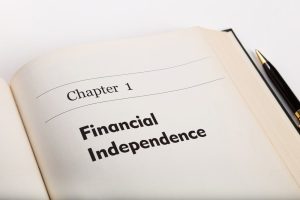
Financial Independence: What It Is And How To Achieve It
Being financially independent means having enough income, savings, or investments to live comfortably for the rest of your
 Written by:
Written by:

Louise is an SEO Writer for Spacer Technology, creating content for the Parkhound, WhereiPark, Spacer.com.au, and Spacer.com brands. Based in the Philippines, she transitioned from her government office job to copywriting in 2012 and has stayed in content production since.
Reading time : 9 mins

They say, ‘a stitch in time saves nine.’ Well, when it comes to home maintenance, that figure could reference the thousands of dollars of damage you could face if you don’t regularly clean and inspect everything to ensure it’s working properly.
It might seem a chore, but proactively establishing whether there are any issues within your property can save you a lot of money and inconvenience in the long run, particularly if you are renting out spare storage or parking space to earn a passive income on Spacer.
As there are many maintenance tasks you’ll need to check, it’s possible you may not know where to begin. So, I’ve put together this essential home maintenance checklist to help you get started.
Your property comprises many elements that can significantly impair the quality of your home life if they break, rust or otherwise become compromised.
Here are six of the main areas of your home that are worth checking on a regular basis.
A leaking or damaged roof can cause havoc to your home, particularly in terms of water leaks and mould. For this reason, it is wise to clean and inspect your roof regularly and keep an eye out for signs of wear, including a build-up of debris, cracked tiles, and rust.
If you can safely climb on the roof, you can check more closely if there are any issues, and it is worth getting it professionally inspected every couple of years because the trained eye might see something you can’t.
If you find any damage that needs to be repaired, it is important to get a licensed contractor to do it for you.
If your house loses its structural integrity, it could present you with big problems because it means the foundation and supporting framework have become weakened.
The longer this is left unaddressed, the greater the risk of a wall or floorboard collapsing and, potentially, your property being deemed unsafe to live in.
A visual inspection is the best way to assess if the structural integrity of your residence is intact. Look for cracks in the foundation and walls, along with signs of uneven rooflines, sagging floors, bowing walls, and gaps between walls and floors.
This is especially important if you are renting out your storage space on Spacer. Take immediate action if you see them.
Homes riddled with mould and moisture are more likely to trigger health issues like coughing, nasal congestion, sneezing, wheezing, respiratory infections, asthma and allergies among those living in them.
At the same time, your home’s structure and building materials can be negatively affected by the deterioration of the surfaces where moisture has accumulated.
Make a point of regularly inspecting wet areas of your home, such as bathrooms, kitchens, and laundry areas, for this type of fungi.
If you spot mould, clean the area thoroughly and consider installing a waterproofing membrane to prevent future growth.
If your home has plumbing issues, you could face a range of problems, from increased water bills due to dripping faucets — especially around the kitchen sink — to extensive water damage from leaks, low water pressure from clogged pipes, and even flooding from burst pipes.
It can also accelerate mould growth and potentially cause illnesses such as salmonella, Legionnaires’ disease, E. coli, and hepatitis A from stagnant water in clogged drains. Additionally, if your air conditioner has a blocked drain line, it could also contribute to excess moisture and further mould growth.
Make sure you regularly inspect your home for leaks and water damage, especially under sinks. It might also be a good idea to record your water meter usage over time to check for leaks and determine if your readings are unusually high.
As they direct rainwater away from your foundation and walls, your gutters and downpipes are your home’s first line of defence against water damage.
However, if they are not regularly cleaned, they can become clogged, which can cause an overflow, which can result in structural damage, flooded basements, damaged siding — plus damage your home exterior and ruined electrical systems.
To keep the gutters clean and clear of debris, clean and inspect them by removing leaves and other obstructions by hand and using a scoop for the rest.
Every year, there are over 17,000 residential fires in Australia, and a significant portion of them are caused by exposed wires.
To avoid becoming part of this statistic, thoroughly check your property to see if all the wires in your home are securely covered in their protective casings.
If they are not, wrap them in electrical insulation tape to prevent them from becoming potentially fatal electrical hazards. Additionally, ensure smoke alarms and carbon monoxide detectors are functioning correctly.
With so much to check, it’s not surprising that you’ll eventually find something that needs repair. This could include home maintenance tasks like fixing leaks, replacing broken fixtures, or ensuring your window and door seals are intact.
Indeed, according to the Australian Bureau of Statistics, the average Aussie male spends around 1.8 hours a week on performing home and vehicle maintenance every year, which could impact you financially if you are trying to earn a passive income by renting out a garage or parking space on Spacer.
Unfortunately, not everyone can do this or afford to pay a contractor to perform the service work.
So, if you are elderly, have mobility issues, or are living with disabilities, there are several home care packages in Melbourne, Sydney, and most other parts of Australia you can call upon for help if something needs to be fixed.
Regular maintenance of homes is essential for the safety and well-being of property owners. However, it can also play a significant role in preventing policy denial from insurance companies in the case of a claim.
For this reason, it is a good idea to keep a record of maintenance tasks — such as roof inspections, plumbing fixes, and house cleaning you have done on your property — as this helps you to prove to insurers that you have followed the required upkeep protocols.
It is also advisable for those with responsibilities for multi-unit dwellings and residential strata insurance to protect themselves in this way.
Your home is one of your biggest assets, and annual maintenance is a necessity. It makes sense to keep it in as good a condition as you can. Our annual home maintenance checklist is a great starting point for regular assessments.
However, if you want it to work even better for you financially, why not lease your extra garage, storage or carport space on Spacer? It’s free to do and can earn you a decent passive income, which could help you pay off your mortgage much faster.
Louise is an SEO Writer for Spacer Technology, creating content for the Parkhound, WhereiPark, Spacer.com.au, and Spacer.com brands. Based in the Philippines, she transitioned from her government office job to copywriting in 2012 and has stayed in content production since.
Louise is an SEO Writer for Spacer Technology, creating content for the Parkhound, WhereiPark, Spacer.com.au, and Spacer.com brands. Based in the Philippines, she transitioned from her government office job to copywriting in 2012 and has stayed in content production since.

Being financially independent means having enough income, savings, or investments to live comfortably for the rest of your

From sorting your things to finding ways to reuse and recycle clutter, we’ve got simple and practical tips

More and more people are participating in the sharing economy as a way to earn passive income, but
This will close in 0 seconds
This will close in 0 seconds